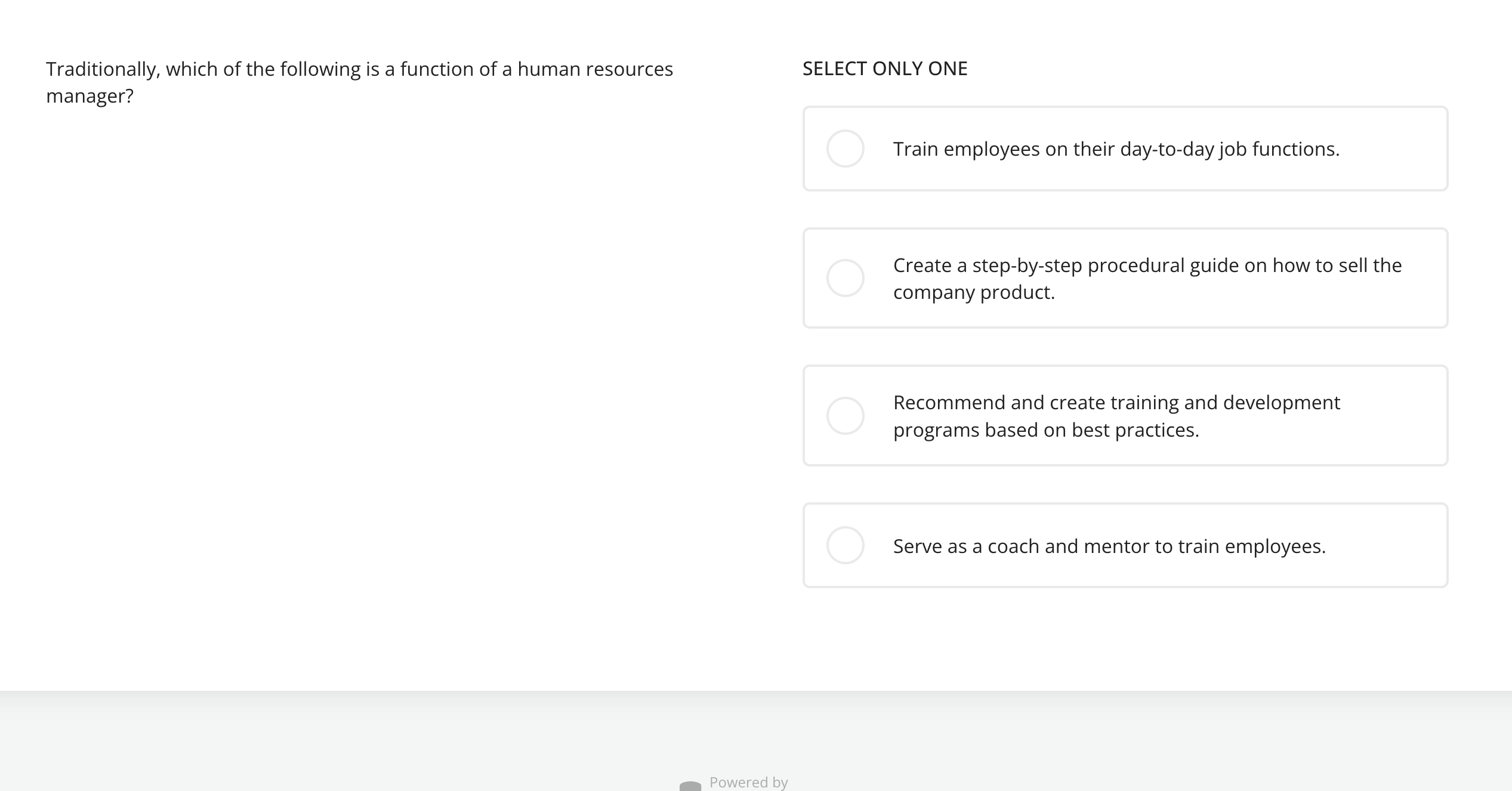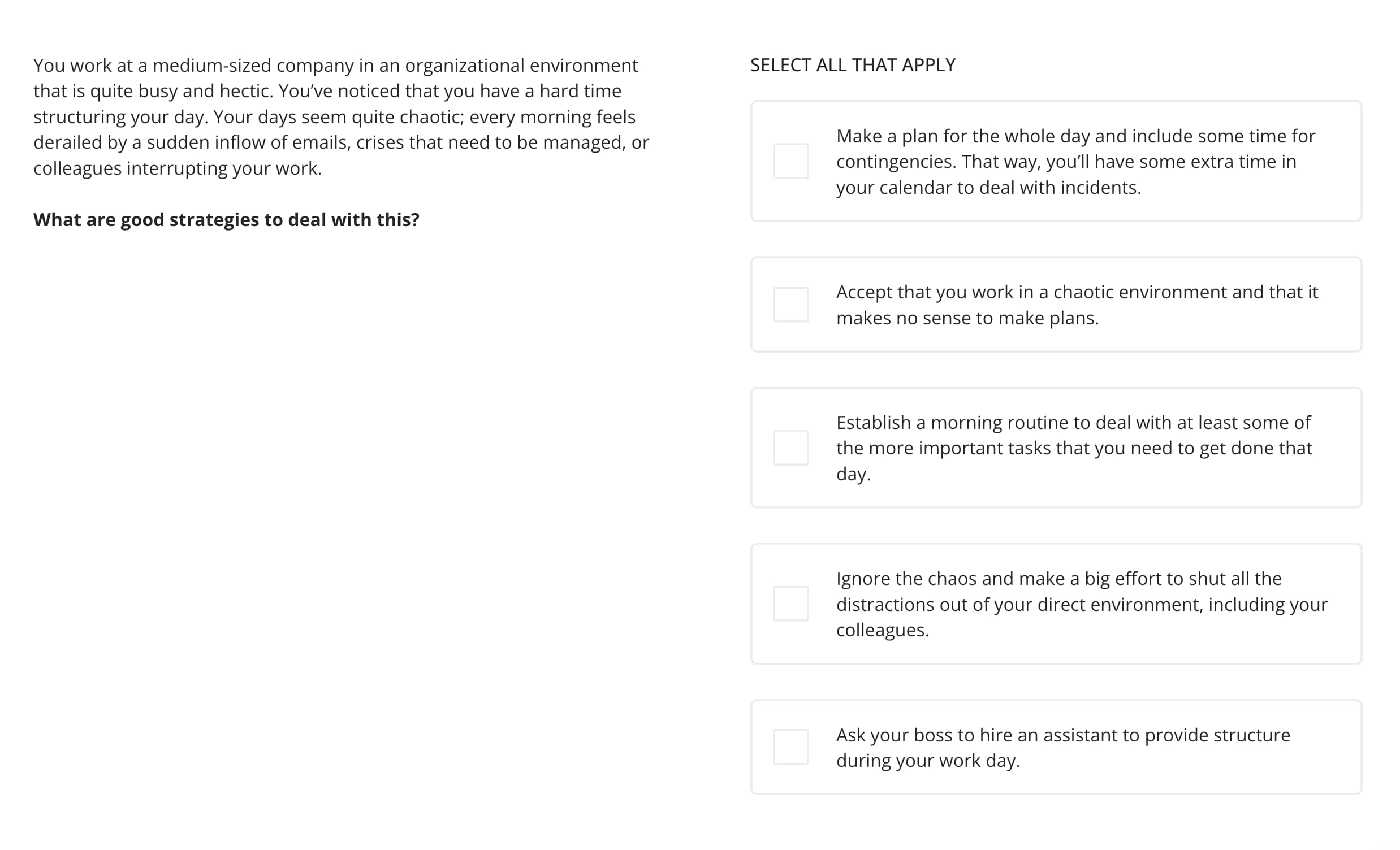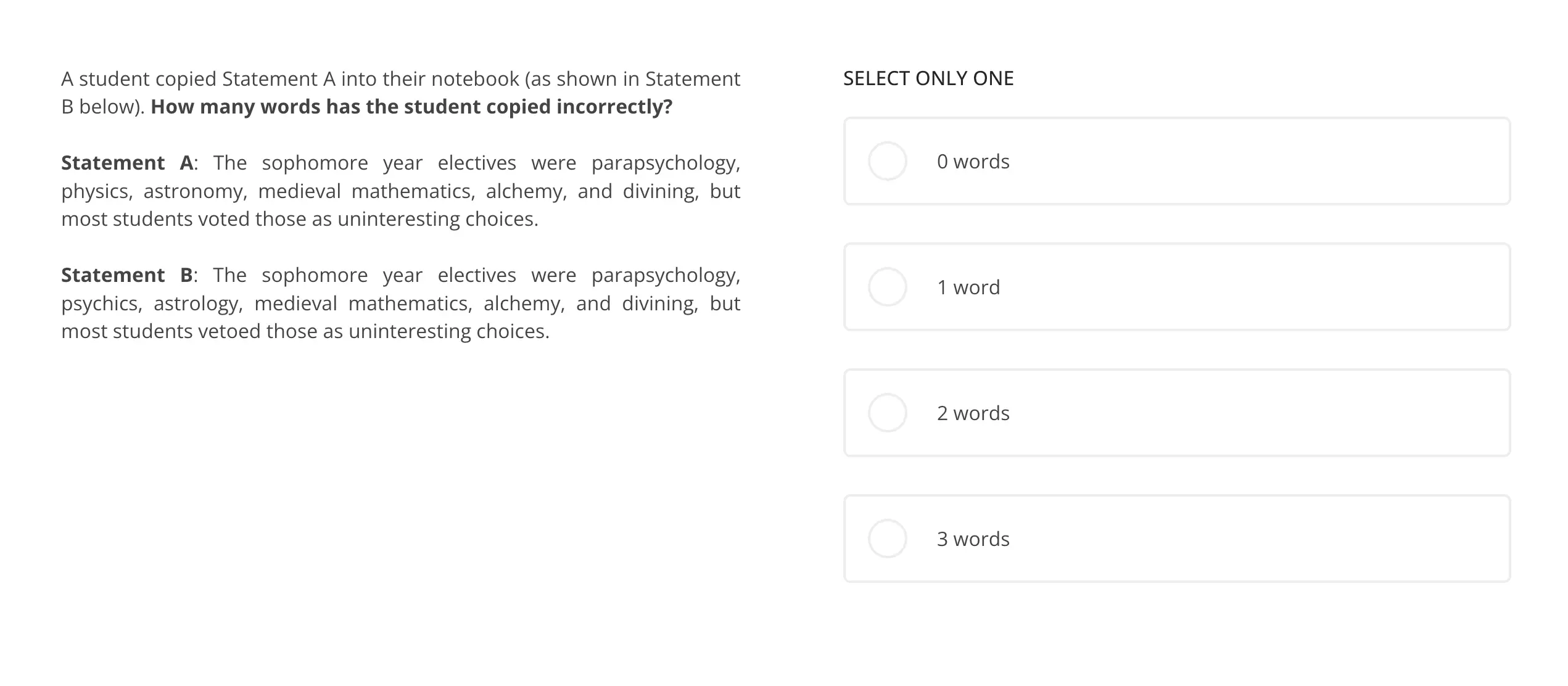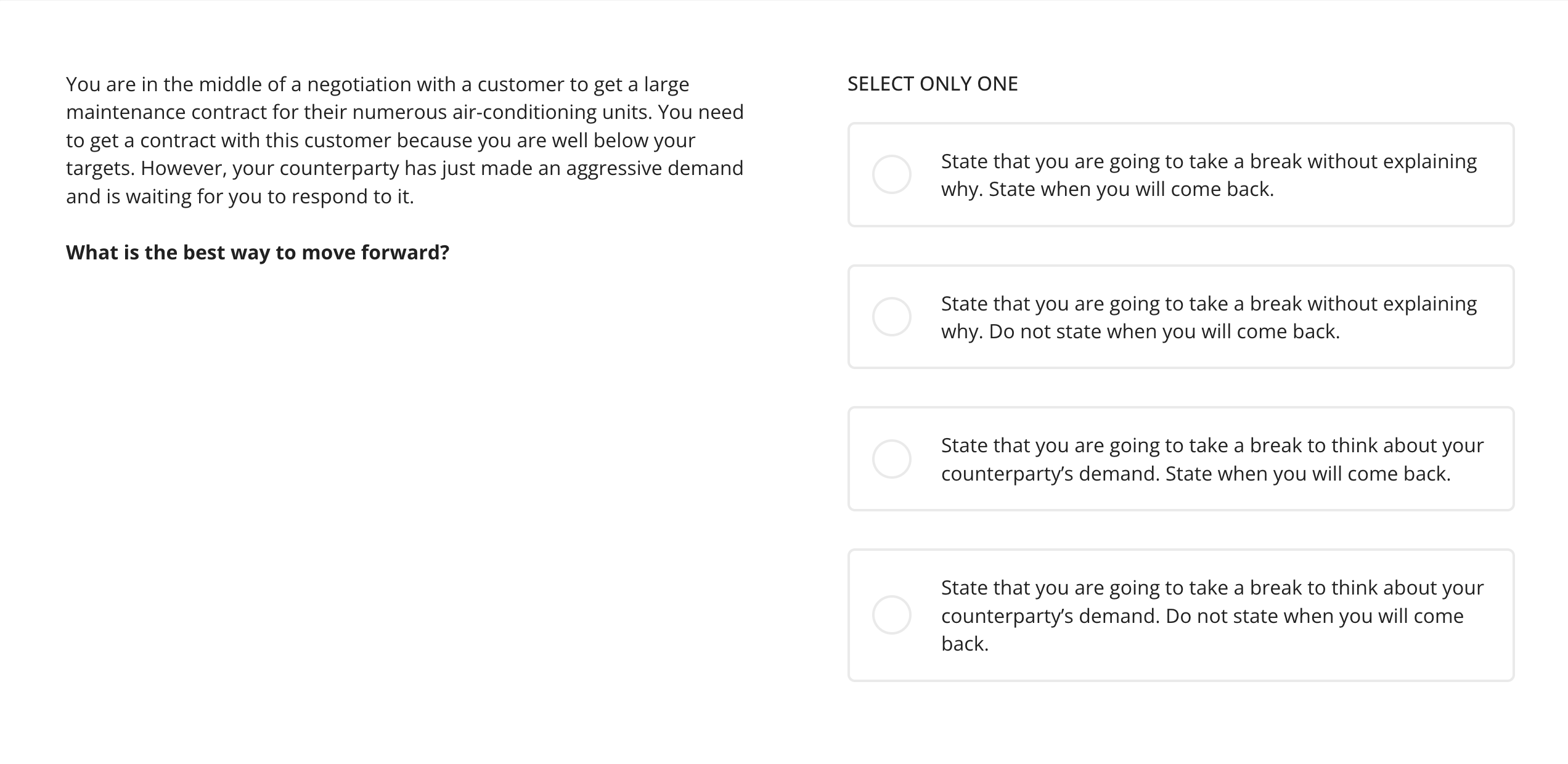9 talent acquisition skills and how to assess them when hiring a talent acquisition specialist
Many companies still rely on traditional resumes to find employees with the right talent acquisition skills. This method is outdated and offers a limited view of the hiring process. It’s like using a paper map instead of Google Maps to navigate a new city.
Talent assessments are the “Google Maps” of hiring, helping you easily identify key skills for talent acquisition specialists.
In this article, we explore the most important talent acquisition specialist skills and explain how to use different tests to assess these capabilities.
Table of contents
- 9 fundamental talent acquisition skills and traits
- How to assess key skills needed for talent acquisition
- 9 key skills for talent acquisition specialists and how to test for them: A summary
- How to hire your next talent acquisition employee with key skills for talent acquisition: 7 steps
- Assess talent acquisition skills with TestGorilla
- Talent acquisition skills FAQs
9 fundamental talent acquisition skills and traits
A talent acquisition employee is one of the crucial recruitment roles in every company. These specialists need diverse hard and soft skills, traits, and job-specific knowledge to excel in their roles.
Let’s take a closer look at the key skills of talent acquisition specialists.
1. HR fundamentals
Talent acquisition employees should have a deep understanding of HR core principles and practices to navigate the complexities of the hiring process.
For example, they should be proficient in standard HR approaches and tools, such as applicant tracking systems and recruitment platforms. These HR technologies are vital for streamlining the hiring process and improving candidate engagement.
A talent acquisition specialist’s understanding of HR fundamentals ensures they can adhere to company policies and legal requirements throughout recruitment. This mitigates risks and ensures compliance.
2. Data analysis skills
Data analysis enables talent acquisition professionals to make smarter, bias-free hiring decisions to employ top candidates. This helps identify trends, measure the success of different sourcing strategies, and understand candidate behaviors.
Relying on data and metrics supports a more strategic approach to recruitment. For example, it can reveal which job boards yield the highest quality candidates or which interview techniques correlate with long-term employee success. These insights help make adjustments to improve hiring outcomes.
Despite its importance, 83% of companies struggle to use talent acquisition analytics thoroughly. This uncovers the potential gap you can exploit by hiring a talent acquisition professional with data analysis skills.
3. Talent acquisition skills
Talent acquisition skills involve a range of capabilities that help specialists identify, attract, evaluate, and hire the right person effectively.
That’s important because talent shortages are on the rise, with 77% of companies struggling to find the talent they need.
Strong skills for talent acquisition can help HR professionals take advantage of the job market trends, adapt to changing industry norms, and position the company as a desirable employer.
Keep in mind that talent acquisition is not just about filling a vacancy. It’s about finding the best long-term fit for the position and your company.
A suitable talent acquisition candidate must perform well at every step of the hiring process. That means sourcing, evaluating skills, recruiting talent, and onboarding.
4. Communication
Lack of communication is the most frustrating part of job search for 35% of talent. That’s why a talent acquisition professional must master the art of communication to fill the positions more effectively.
Good communication is vital for every part of a candidate’s journey, from the initial job posting to the final offer letter. Each interaction shapes a person’s perception of the company and decision to take the job.
Talent acquisition specialists must be able to create clear, concise job descriptions to ensure potential applicants understand the role and its requirements.
During interviews, effective communication and active listening reveal deeper insights into candidates’ skills and fit. In addition, timely and transparent communication through the selection process keeps candidates informed and engaged, reducing uncertainty and frustration.
Lastly, strong communication skills and employer branding help talent acquisition employees convey the organization’s values and culture, making it easier to build a connection with the candidate.
5. Time management
The recruitment process is complex and challenging, which is why talent acquisition managers often need to juggle multiple responsibilities at once. That can include everything from sourcing candidates and conducting interviews to navigating administrative tasks.
Good time management skills help talent acquisition specialists to prioritize tasks effectively. This ensures that critical deadlines are met and the recruitment process moves forward smoothly.
Given the unpredictable nature of hiring, specialists often encounter unforeseen challenges and last-minute issues, such as unexpected vacancies or changes in job requirements.
That’s why the ability to adapt quickly and re-prioritize tasks is one of the most important talent acquisition skills for maintaining the momentum of the hiring process.
6. Attention to detail
Attention to detail is so important because it helps talent acquisition employees personalize their approach to each candidate. As a result, they can craft a better outreach strategy and improve the overall effectiveness of their talent acquisition efforts.
Noticing subtle cues in resumes, cover letters, and interviews that can indicate a candidate’s suitability for the role are important talent acquisition skills.
High attention to detail is one of the key skills for talent acquisition specialists because it contributes to a more positive candidate experience. According to research, companies that invest in a better candidate experience improve the quality of hires by 70%
7. Problem-solving skills
Problem-solving is important in talent acquisition because of the constant challenges in the hiring process. This skill set helps identify issues accurately, breaking them into manageable parts, developing strategies to resolve them effectively, and executing action plans.
For example, when faced with a hard-to-fill position due to a shortage of qualified candidates, a skilled specialist can explore alternative sourcing strategies, such as employee referral programs.
This adaptability keeps the recruitment process agile and responsive to the dynamic needs of the job market.
Problem-solving is vital for improving candidate experience, streamlining recruitment efficiency, and implementing new technologies.
8. Negotiation
Talent acquisition professionals’ negotiation abilities directly impact the organization's potential to secure top talent under favorable conditions. This skill is vital for managing stakeholder expectations and aligning hiring managers' requirements with market conditions.
Effective negotiation helps build positive relationships with candidates, ensuring they feel valued and understood.
For example, when a highly skilled candidate’s salary expectation exceeds the budget, a specialist with strong negotiation skills can explore alternatives to create an attractive offer. They can present flexible working conditions, excellent professional development plans, or performance-based bonuses.
9. Empathy and social skills
Empathy helps talent acquisition specialists connect with candidates personally, understanding their concerns, aspirations, and motivations. This connection can transform the recruitment experience, making candidates feel valued and respected.
This is crucial because 87% of employees believe that empathy in the workplace is important for their job satisfaction.
Social skills are equally important, enabling specialists to navigate diverse interactions smoothly, whether networking at industry events, coordinating with hiring teams, or engaging candidates.
How to assess key skills needed for talent acquisition
We offer dozens of tests you can use for talent acquisition skills assessment and skills-based hiring.
Let’s explore how to evaluate talent acquisition skills using the most applicable tests to this position.
Here’s a quick summary of our nine picks before we dive into the details:
HR Fundamentals test
Working with Data test
Talent Acquisition test
Communication Skills test
Time Management test
Attention to Detail test
Problem Solving test
Negotiation Skills test
DISC Personality test
HR fundamentals
The HR Fundamentals test is designed to evaluate a person’s understanding of the core principles and practices of human resources management.
This talent acquisition assessment evaluates the knowledge of HR practices, laws, and strategies crucial for effectively managing the workforce and ensuring organizational compliance.
It examines the candidate’s proficiency in various HR tasks, including the creation of job descriptions, understanding of labor laws, and execution of employee onboarding. In addition, the test helps you evaluate whether a candidate is good at recommending actionable solutions and managing relationships.
Data analysis skills
Our Working with Data test is a quick assessment designed to evaluate data handling skills, which are one of the most important technical skills for talent acquisition.
In a concise 10-minute window, candidates face tasks that test their ability to input, analyze, and manipulate spreadsheet data. The test comprises practical questions that reflect real-world data scenarios.
This talent acquisition assessment offers a peek into a candidate’s proficiency with data and ability to extract meaningful insights from raw information.
Here’s what the questions look like:
If you’re interested in more sample questions, check out the Working with Data test preview.
Talent acquisition skills
Incorporating TestGorilla’s Talent Acquisition test into your recruitment process can streamline candidate evaluation and ensure you hire the right talent acquisition employee.
This test is designed to gauge a candidate’s proficiency in the fundamental aspects of talent acquisition, including recruitment analytics skills and data-driven decision-making.
This 10-minute talent assessment offers a concise yet comprehensive evaluation of a candidate’s practical skills in talent acquisition. This provides insights into their capabilities in sourcing, evaluating, and hiring top talent.
Here’s an example of a question you can find on this test:
Hiring managers can integrate the talent acquisition test into the early stages of their recruitment process to screen candidates efficiently.
Following up on the test results during interviews can further explore how candidates have applied their data analysis skills during past roles in their career path.
Communication
The Communication Skills test evaluates a candidate’s ability to convey and interpret messages clearly and efficiently, whether it’s through writing, speaking, or active listening skills.
This ability is crucial for maintaining the flow of information, setting clear expectations, and building strong relationships within and outside the organization.
Talent acquisition specialists need a range of communication styles to cater to multiple organizational levels within the company, from senior executives to department heads, HR colleagues, and candidates.
This test also assesses a person’s ability to digest and summarize key information, ensuring they’re able to pull out the most relevant points in any communication.
Here’s an example of a question this test uses to gauge candidates’ communication skills:
Hire the best talent assessment professionals
Curious to see how you can use TestGorilla’s talent assessments to hire the best talent assessment professionals?
Time management
Our Time Management test is designed to assess a person’s ability to prioritize, plan, and execute tasks efficiently. All these skills are essential for the fast-paced, multitasking nature of talent acquisition roles.
The questions challenge candidates with scenarios that mirror real-world situations, requiring them to demonstrate how they would manage competing deadlines, handle unexpected tasks, and maintain productivity under pressure.
The results evaluate their ability to organize workload, set priorities, and use their time to achieve optimal outcomes.
Attention to detail
The Attention to Detail test helps HR professionals evaluate a person’s ability to pay attention to critical details and not make any oversights.
The test contains questions that require careful consideration. It measures the potential to identify discrepancies, inconsistencies, and errors, which helps the hiring manager establish whether a candidate can maintain a high standard in their work.
A good score on this test points to a candidate who is thorough and accurate. As a result, they are more likely to draft precise job descriptions, create a reliable recruitment process, and ensure compliance with hiring policies.
Problem-solving skills
A team member with exceptional problem-solving skills can think creatively to solve problems and overcome difficult situations. That’s a key skill for talent acquisition managers because the role often requires quick deliberation and adaptability to changing circumstances.
When things go south, or a new challenge appears, you don’t need someone who freezes and waits for you to tell them what to do. Instead, you need a proactive thinker who is not afraid to brainstorm imaginatively to overcome the presented obstacles.
TestGorilla’s Problem Solving test helps employers find candidates who can analyze, approach, and resolve challenges.
The test presents candidates with a variety of problems ranging from logical reasoning puzzles to situational judgment scenarios. These questions assess their ability to process information, think critically, and create effective solutions.
Here’s an example of a problem candidates need to solve in this test:
For more questions from this test, check out the Problem-Solving Skills test preview.
Negotiation
Talent acquisition employees often manage conversations around offers, contracts, and stakeholder expectations. That’s why they need to be able to negotiate and reach mutually beneficial outcomes effectively.
The Negotiation Skills test contains 16 multiple-choice questions that assess negotiation skills.
These skills are necessary to understand the needs and interests of all parties involved and create solutions that align with organizational goals while satisfying candidate expectations.
Incorporating this test into your recruitment process can help you identify candidates who can advocate for the company’s interests while maintaining positive relationships with potential hires.
Empathy and social skills
Our DISC Personality test is an insightful tool for evaluating empathy and social skills crucial for talent acquisition roles.
The DISC test helps you understand a candidate’s personality traits, focusing on how they interact and communicate with others. It includes a series of self-evaluation statements a person can rate from one (very inaccurate) to five (very accurate).
Here’s an example:
The answers provide insights into natural responses and tendencies in social settings.
By understanding a person’s DISC profile, employers learn more about their potential for empathetic engagement and effective social interaction.
Find a candidate with the best talent acquisition specialist skills
Are you ready to hire a candidate with the best talent acquisition specialist skills using TestGorilla’s talent assessments?
9 key skills for talent acquisition specialists and how to test for them: A summary
Here’s a quick recap of what we’ve covered so far.
Talent acquisition skill | Talent assessment to use | Benefits |
1. HR fundamentals | HR Fundamentals test | Assesses knowledge of HR practices, tools, compliance, and strategic alignment with business goals and initiatives |
2. Data analysis | Working with Data test | Evaluates ability in handling, analyzing, and visualizing recruitment data |
3. Talent acquisition | Talent Acquisition test | Identifies proficiency in candidate sourcing, recruitment analytics, and data-driven decision-making |
4. Communication | Communication Skills test | Evaluates clarity in conveying messages, understanding needs, and active listening |
5. Time management | Time Management test | Measures ability to prioritize, plan, and execute tasks efficiently |
6. Attention to detail | Attention to Detail test | Assesses thoroughness and accuracy in tasks, reducing errors in the recruitment process |
7. Problem-solving | Problem Solving test | Identifies the capacity to think critically and creatively to overcome recruitment challenges |
8. Negotiation | Negotiation Skills test | Assesses the ability to reach mutually beneficial outcomes and advocate for company interests |
9. Empathy and social skills | DISC Personality test | Reveals interpersonal skills, empathy in communication, and ability to build positive relations |
How to hire your next talent acquisition employee with key skills for talent acquisition: 7 steps
Developing a clear strategy to assess talent acquisition skills in candidates makes the hiring process faster and more efficient.
Below is a quick step-by-step guide to hiring your next talent acquisition employee.
Step | What to do |
1. Write an accurate job posting | Be clear and transparent to attract suitable candidates. |
2. Post a job ad | Use the biggest social media and recruiting platforms to reach the best talent. |
3. Prepare a skills test | Evaluate your candidates’ skills accurately and objectively. That way, you can easily hire a talent acquisition specialist (or even a talent acquisition manager) using TestGorilla. |
4. Administer the skills assessment to all applicants | Include the link in the job description or send invitations directly to your candidates by email or through your ATS. |
5. Analyze results | Compare the results to the benchmarks or hiring goals you established. |
6. Invite the best candidates to an interview | Personalize the interview by asking questions connected to the candidate’s result and the parts that stood out to you. |
7. Make a hiring decision | Use the results from the assessments and impressions from the interview questions to hire the right candidate. You can also create employee training that helps them develop any areas of weaknesses. |
Assess talent acquisition skills with TestGorilla
We offer more than 400 skills tests to help you evaluate the skills of potential candidates. If you’re interested in learning more, you should take a product tour to explore all the functionalities of our platform and how you can use it to hire the best.
You can test skills needed for talent acquisition, such as:
HR fundamentals
Data analysis
Talent acquisition skills
Communication
Time management
Attention to detail
Problem-solving
Negotiation
Empathy and people skills
In addition, TestGorilla also enables hiring managers to create custom questions and combine different tests into one comprehensive assessment. Book a live demo to learn how to do that effectively.
Are you ready to start your recruitment journey with TestGorilla? Sign up for a free forever plan today!
Talent acquisition skills FAQs
Still have questions about talent acquisition skills? Find your answers below.
What is a talent acquisition skills assessment?
A talent acquisition skills assessment is a systematic evaluation that measures a candidate’s skills required for talent acquisition roles. The assessment typically involves tests that assess skills such as:
Sourcing
Interviewing
Negotiation
Data analysis
Communication
This ensures that candidates possess the necessary qualifications and skills for effective talent acquisition and recruitment.
What makes you a good fit for a talent acquisition role?
Being a good fit for a talent acquisition role requires a blend of interpersonal, strategic, and technical competencies. Essential skills include strong communication abilities, proficiency in data analysis, and a strategic mindset for sourcing and engaging talent.
A good talent acquisition professional empathizes with others, negotiates effectively, and possesses a deep understanding of HR fundamentals.
What are the skills required for a talent acquisition specialist?
A talent acquisition specialist requires a mix of the following key skills:
Expertise in talent acquisition and recruitment strategies
Clear and effective communication
Solid understanding of HR practices
Efficient time management
Impeccable attention to detail
Strong negotiation skills
Creative problem-solving abilities
Proficiency in data analysis for informed decision-making
Empathy and people skills for building relationships
How do you master talent acquisition?
Mastering talent acquisition requires continuous learning and adapting to evolving industry trends and standards. It involves honing important skills such as strategic sourcing, effective communication, and data-driven decision-making. Great talent acquisition professionals work on:
Building strong relationships
Understanding HR processes
Talent acquisition skills are important because they directly impact a person’s ability to attract, engage, and hire the right talent. These capabilities ensLearning new technologies
Developing strong social and analytical skills
Why are talent acquisition skills important?
Talent acquisition skills are important because they directly impact a person’s ability to attract, engage, and hire the right talent. These capabilities ensure that recruitment processes are efficient, hiring strategies adapt to market changes, candidates have positive experiences, and hires align with organizational goals and culture.
What is the key role of talent acquisition?
The vital role of talent acquisition is to strategically source, attract, and hire individuals who align with the company culture and goals. Managers with talent acquisition skills fill open positions and build talent pipelines to secure a skilled and agile workforce. They are crucial for shaping the workforce, influencing organizational performance, improving retention rates, and contributing to long-term success.
What are the 5 phases of talent acquisition?
The 5 phases of talent acquisition are:
Planning: Identifying staffing needs and defining the ideal candidate profile
Sourcing: Actively seeking out candidates through various recruitment channels
Screening: Evaluating candidates’ skills, experience, and fit for the role
Interviewing: Conducting in-depth assessments to further measure suitability
Offering and onboarding: Making job offers and integrating new employees into the organization
Related posts
You've scrolled this far
Why not try TestGorilla for free, and see what happens when you put skills first.
Latest posts
The best insights on HR and recruitment, delivered to your inbox.
Biweekly updates. No spam. Unsubscribe any time.

Skills tests to hire the best
Our screening tests identify the best candidates and make your hiring decisions faster, easier, and bias-free.
Free resources
A step-by-step blueprint that will help you maximize the benefits of skills-based hiring from faster time-to-hire to improved employee retention.
With our onboarding email templates, you'll reduce first-day jitters, boost confidence, and create a seamless experience for your new hires.
This handbook provides actionable insights, use cases, data, and tools to help you implement skills-based hiring for optimal success
A comprehensive guide packed with detailed strategies, timelines, and best practices — to help you build a seamless onboarding plan.
This in-depth guide includes tools, metrics, and a step-by-step plan for tracking and boosting your recruitment ROI.
Get all the essentials of HR in one place! This cheat sheet covers KPIs, roles, talent acquisition, compliance, performance management, and more to boost your HR expertise.
Onboarding employees can be a challenge. This checklist provides detailed best practices broken down by days, weeks, and months after joining.
Track all the critical calculations that contribute to your recruitment process and find out how to optimize them with this cheat sheet.

























